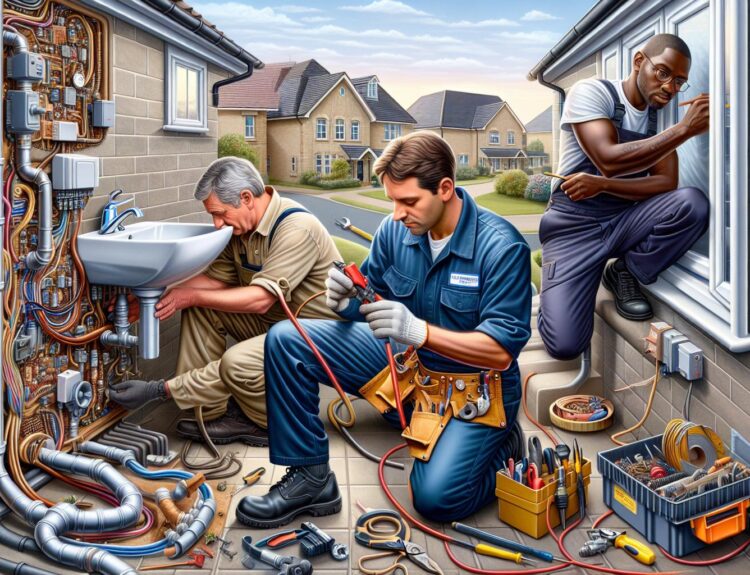Deciding between renting and buying a home in Detroit isn’t just about comparing monthly payments. It’s about weighing the perks and drawbacks in a city that’s both historic and evolving. As someone who’s navigated these waters, I’ve seen firsthand how the choice can shape your lifestyle and finances.
Renting in Detroit offers flexibility and less responsibility for maintenance, making it appealing for those not ready to plant roots. On the flip side, buying a home is an investment in the city’s future and your own, despite the upfront costs and commitment. Let’s dive into the pros and cons to help you make an informed decision that fits your life.
Affordability Factor: Renting vs. Buying
When I first considered making a move to Detroit, the affordability factor was a huge part of my decision-making process. Being someone who’s always on the lookout for a good deal, I dug deep into the costs associated with both renting and buying in this vibrant city. Here’s what I found.
The Cost of Renting
Renting in Detroit can be quite appealing, especially for those new to the city or not ready to commit to a mortgage. It’s easy to find various rental options that cater to different budgets. However, rent prices have been on the rise, in line with national trends. For a basic one-bedroom apartment in a decent neighborhood, you’re looking at anywhere from $800 to $1,200 a month. The upside? Renting requires no long-term financial commitment, and you don’t have to worry about extra costs like property taxes or maintenance.
The Cost of Buying
Buying a home in Detroit is an enticing prospect for many. The city’s efforts to revitalize have led to an increase in housing demand, causing prices to rise. Yet, compared to other major cities, Detroit remains relatively affordable. Here’s a quick breakdown of the median home prices and associated costs:
| Description | Cost |
|---|---|
| Median Home Price | $55,000 |
| Down Payment (20%) | $11,000 |
| Monthly Mortgage Payment | $250* |
*Note: Monthly payments can vary depending on interest rates and loan terms.
Investing in a Detroit home means you’re also investing in the city’s future. While the initial costs can be high, with down payments and closing fees, homeownership comes with the potential for property value appreciation. Furthermore, there are various homebuyer assistance programs available to help mitigate some of these upfront costs.
Renting vs. Buying: Which is More Affordable in the Long Run?
Making the choice between renting and buying all boils down to your financial situation and how long you plan to stay in Detroit. Renting offers flexibility and predictable monthly expenses, ideal for those who value mobility or aren’t ready for the maintenance chores of homeownership. On the other hand, buying a home is a long-term investment that can lead to wealth accumulation through equity. However, it requires a stable income and the willingness to stay put for at least a few years to make the most out of your investment.
Flexibility: Pros and Cons of Renting
When I first moved to Detroit, one of the most appealing aspects of renting was the flexibility it offered. Unlike homeownership, renting doesn’t tie me down to one location for an extended period. If my job situation changes or I decide it’s time for a new environment, relocating is far more straightforward. This flexibility is a significant advantage for anyone whose career might demand sudden moves or those who just love the freedom to explore new neighborhoods without a long-term commitment.
Another plus is the lack of maintenance responsibilities. As a renter, I don’t have to worry about fixing a leaky roof or dealing with a broken furnace. These issues are generally the landlord’s responsibility, making life easier and potentially saving thousands of dollars in maintenance and repair costs. It’s a comforting feeling, knowing I’m not on the hook for major repairs or upkeep, allowing me to allocate funds to other priorities or savings.
However, renting isn’t without its cons. One major downside is the lack of control. I can hang pictures or paint walls in my current apartment, but any significant changes or renovations are out of the question. For someone who dreams of customizing their living space extensively, this can feel restrictive.
Additionally, the financial aspect of renting can be a double-edged sword. While I’m not tied down to a mortgage, rent prices in Detroit have been on the rise, which means a significant portion of my monthly income goes straight to my landlord, with no equity being built. Monthly Rent Ranges in Detroit vary widely:
| Location | Low End | High End |
|---|---|---|
| Downtown | $1,000 | $2,200 |
| Midtown | $800 | $1,600 |
| Suburban Detroit | $700 | $1,200 |
These numbers show how rent can fluctuate based on location, but no matter where you choose, it’s money that you won’t see again, unlike mortgage payments which contribute towards home equity.
Ultimately, while the flexibility of renting offers a low-commitment way to live in Detroit, it’s essential to weigh that against the lack of property investment and personalization options. Each individual’s situation varies, making it crucial to consider personal priorities and long-term plans when deciding whether to rent or buy in this vibrant city.
Investment Opportunity: Pros and Cons of Buying
When I started looking into buying a home in Detroit, I quickly realized it wasn’t just about having a place to call my own. It’s also a significant investment opportunity, though it comes with its share of pros and cons.
Pros:
- Building Equity: One of the most compelling reasons for me to buy a home was the ability to build equity over time. Unlike rent, which goes straight into a landlord’s pocket, a portion of each mortgage payment goes toward the principal amount of the loan, increasing my ownership stake.
- Tax Advantages: As a homeowner, I’ve been able to take advantage of several tax deductions, such as mortgage interest and property taxes, which can significantly reduce my annual tax bill.
- Potential for Appreciation: Detroit’s housing market has had its ups and downs, but over the long term, homes generally appreciate in value. This means that the property I buy today could be worth significantly more in the future, translating to a solid return on investment when I decide to sell.
- Upfront Costs: The initial costs of buying a home — down payment, closing costs, inspections, and more — were daunting. It took me a while to save enough to comfortably cover these expenses without emptying my savings account.
- Maintenance and Repairs: Owning a home means I’m responsible for all maintenance and repair costs. This can range from minor fixes to major issues, like roof repairs or plumbing problems, which can be quite costly.
- Market Risk: While homes can appreciate in value, they can also depreciate. Market conditions, neighborhood changes, or economic downturns can negatively affect my home’s value, which is a risk I had to consider.
When weighing these pros and cons, it became clear that buying a home is a significant commitment, not just financially but also in terms of time and responsibility. It’s not just about the monthly mortgage payment; it’s about being ready to invest in a property, maintain it, and potentially deal with fluctuations in the market. Each person’s situation is unique, and what made sense for me might not be the right choice for someone else. Considering individual priorities and long-term plans is crucial in deciding whether buying a home in Detroit is the right step.
Financial Considerations: Costs and Savings
When I started looking into the financial side of renting versus buying a home in Detroit, I was immediately struck by the complexity of the decision. It’s not just about the monthly mortgage payment compared to rent but a whole slew of other financial factors that come into play.
First off, let’s talk about the initial costs. Buying a home comes with a down payment, typically 20% of the home’s value, although there are programs out there that allow for lower down payments. There are also closing costs, which can add up to thousands of dollars. When I compared this to the cost of moving into a rental, which usually requires a security deposit along with the first and last month’s rent, the initial financial barrier to buying was significantly higher.
However, the financial dynamics start to shift when you consider long-term costs and savings. Here’s a rough breakdown:
| Costs/Savings | Renting | Buying |
|---|---|---|
| Initial Costs | Low | High |
| Monthly Payments | Fixed Rent | Mortgage + Taxes + Insurance |
| Maintenance | Landlord | Homeowner |
| Equity Building | None | Yes |
Monthly costs for homeowners, beyond the mortgage, include property taxes, homeowner’s insurance, and maintenance. These can fluctuate, making budgeting a bit trickier than the fixed cost of rent. On the flip side, part of each mortgage payment goes towards building equity in the home, something renting doesn’t offer.
The potential for property appreciation in Detroit is another critical factor. If the market’s healthy, the value of a home can increase over time, offering a significant return on investment when it’s time to sell. Renters, on the other hand, don’t benefit financially from any appreciation in property value where they live.
Tax advantages also lean in favor of buying. Homeowners can deduct mortgage interest and property taxes on their federal income taxes, which can lead to substantial savings over time. Renters, sadly, don’t receive these benefits.
Yet, there’s a flexibility that comes with renting that’s hard to put a price on. Renters can move with relative ease without worrying about selling a home, which is a significant plus for some people.
Lifestyle Impact: Renting vs. Buying in Detroit
When I think about whether to rent or buy a home in Detroit, it’s not just the financial aspects that weigh heavy on my mind, but the lifestyle impacts as well. Each choice presents a distinct way of living, shaping day-to-day experiences and long-term plans alike.
Renting, for one, offers an unparalleled level of flexibility. I’ve found that not being tied down to a mortgage allows me to relocate with ease, whether it’s for a new job opportunity or just a change of scenery. This mobility is a significant perk, especially in an evolving city like Detroit where neighborhoods are continually transforming. Additionally, renting means I’m not responsible for maintenance or repairs, freeing up time and money that I can invest elsewhere, be it traveling, education, or hobbies.
On the flip side, buying a home in Detroit affords a sense of stability and community connection that renting seldom does. Owning a home means setting down roots in a neighborhood, getting to know the neighbors, and often, participating more actively in local events and community boards. This stability has its charms, especially for those looking to start families or for anyone keen on forging lasting community ties. There’s also the psychological benefit of ownership, which for many, brings a profound sense of security and personal achievement.
However, homeownership in Detroit demands a level of commitment that isn’t for everyone. Beyond the financial responsibilities, owning a home requires time for upkeep and a readiness to handle unexpected repairs, from leaking roofs to faulty HVAC systems. It’s a long-term investment, not just in financial terms, but in terms of life energy and personal bandwidth as well.
Another point to consider is how these choices align with lifestyle priorities. For active individuals seeking vibrant, urban living, Detroit’s downtown and midtown rentals provide access to the heart of the city’s cultural and social scenes. Meanwhile, those looking for peace, space, and a place to call their own might find the suburbs more appealing, where buying a home often makes more sense both financially and lifestyle-wise.
In the end, the decision between renting and buying in Detroit significantly reflects one’s lifestyle preferences, goals, and values. While I’ve always leaned towards the flexibility and freedom associated with renting, I’ve also envied the stability and sense of belonging that comes with homeownership. It’s a complex balance, influenced by both immediate desires and long-term aspirations.
Conclusion
Deciding whether to rent or buy in Detroit boils down to what matters most to you. If you’re after flexibility and minimal responsibility, renting’s your go-to. But if you’re dreaming of laying down roots and building a community, buying might just be your path. Remember, it’s not just about the numbers on a paper; it’s about how you want to live your life. Whether you’re drawn to the vibrant city life or the quiet of the suburbs, Detroit has something for everyone. So take a moment, weigh your priorities, and choose the option that aligns with your vision for the future. After all, home is where the heart is, whether it’s one you own or one you rent.






